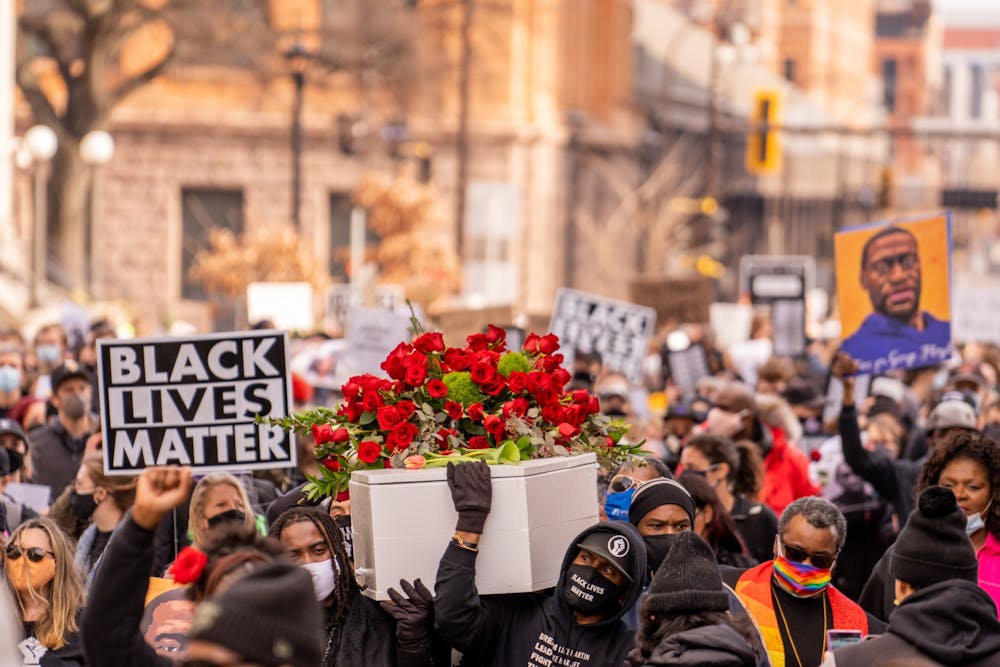On April 20, former Minneapolis, Minn. police officer Derek Chauvin was convicted of the murder of George Floyd. Members of the University community are weighing in on the implications of this verdict.
Floyd's death sparked numerous protests across the nation and in Princeton. During the trial, the jury found Chauvin guilty on all charges brought against him: second-degree unintentional murder, third-degree murder, and second-degree manslaughter.
Professor of African American Studies Eddie Glaude Jr. has stated that the guilty verdict represents the possibility of shifting attitudes toward police accountability.
“The verdict signals the beginning of a possible shift in how we think about policing in this country. Minimally, it lets police officers know they cannot act with impunity as if they are above the law,” Glaude wrote in an April 21 ‘Time’ piece titled “The Derek Chauvin Verdict Is Haunted by the Ghosts of Those Who Found No Justice.”
Other community members emphasized the importance of Chauvin being held accountable, but noted that the verdict may not indicate a sweeping change in police accountability.
"I wouldn’t call the verdict justice, and I would hesitate to even frame it as accountability,” Josiah Gouker ’22 wrote in a statement to The Daily Princetonian.
Gouker sees Chauvin’s actions as part of a broader issue of police violence that he believes the guilty verdict does not address.
“This is just one case in a long history of indiscriminate extrajudicial killing of Black people by the state,” he wrote. “George Floyd was not ‘sacrificing his life’ to make America better. He was killed against his will, in cold blood — and there was a chance that Chauvin could have gotten away with it, just as countless state actors who have done so in the past, just (sometimes) not on screen for the whole world to see. It is necessary to hold the officer who did this accountable, yes, but it is more important to hold accountable the society that allows this to happen.”
In an email to the ‘Prince,’ Assistant Professor of Politics and Public Affairs Jonathan Mummolo wrote that he thinks Chauvin’s guilty verdict does not guarantee change.
Mummolo co-founded the Research on Policing Reform and Accountability project, which focuses on creating statistical techniques to measure racial bias in policing, evaluating policing policy reforms, and improving police organization performance.
“The murder of George Floyd has brought renewed attention to the pressing issue of police brutality in marginalized communities,” he wrote. “Whether the Chauvin verdict—a rare instance of accountability in such cases—will lead to large-scale policy change is unclear.”
“As with so many other persistent problems, America has a history of appearing concerned about abusive policing from time to time, only to lose focus and let the status quo prevail,” Mummolo added.

Andrea Campbell ’04, a Boston City Councilor and candidate for mayor of Boston, told WGBH that the Chauvin verdict does not signify the end of the fight for justice.
“The work to transform our approach to public safety, to eradicate systemic racism, and to ensure all have equitable access to justice does not end with the Derek Chauvin verdict,” Campbell said. “This work continues until no family ever experiences what the Floyd family, and countless others, have.”
In an email to the ‘Prince,’ Associate Professor of History and African American Studies Joshua Guild discussed the importance of acknowledging systemic racism and its relation to prison and policing.
"Until we honestly confront the systemic devaluation of Black life and our collective over reliance on punitive and carceral solutions to social inequality and state failure, thousands more Black and brown parents will have to bury their children prematurely," he wrote.
The University has compiled lists of events and resources on its website to help community members process the verdict and reflect on its longer-term implications.
Ultimately, according to Assistant Professor of Politics Omar Wasow, the struggle to reform policing will continue long past Chauvin’s conviction.
“This is going to be a long period of contestation and I think any analysis that tries to say ‘victory’ or ‘loss’ on any one moment is missing the degree to which this is going to be playing out for decades,” Wasow said in an interview with the ‘Prince.’








